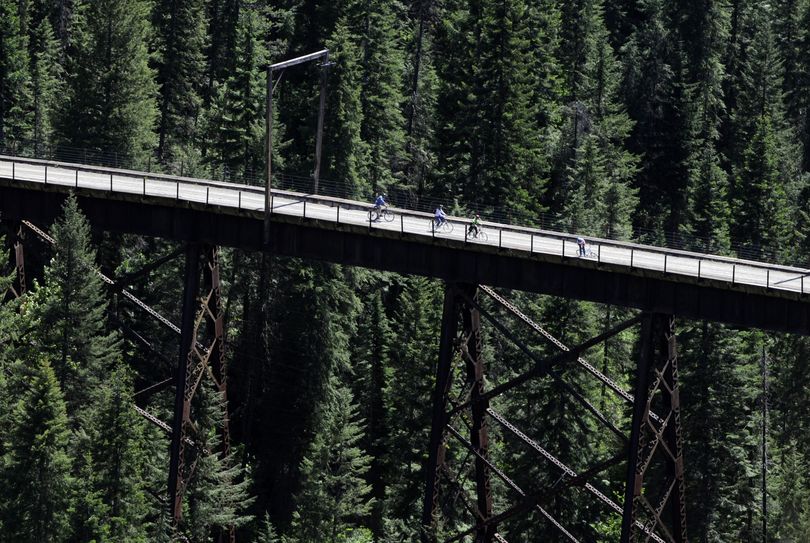Updated: More groups speak out against states’ federal land grab

Updated Feb. 4 at 11:30 a.m. with news of final Idaho report on federal transfer proposals.
PUBLIC LANDS -- The evidence, logic and sentiment is mounting against the sham some legislators are continuing as they court private interest groups by stumping for state take-overs of federal public land.
- A few Washington lawmakers are the latest to join the bandwagon.
- Montana's latest headline on the issue: Transfer of federal lands to state hands splits Montanans, lawmakers
The movements in several Western states are being exposed as a threat to public access of prized outdoor destinations as well as a waste of legislative time and taxpayer dollars.
The cause has rallied a growing number of sportsmen's groups and outdoor business.
- Read a report-- Our Public Lands Not for Sale -- by the Backcountry Hunters & Anglers, a topic that's likely to be addressed during the national group's 4th annual Rendezvous March 6-8 at the Red Lion Hotel in Spokane.
Here's the latest in the news:
Idaho legislators should stop wasting time on federal lands transfer
There has been enough time and effort expended on Idaho legislators' study of taking over management of federal lands and/or the outright transfer of those lands to the state. Given what the past two years of such study has yielded, i.e., that the campaign for such a transfer originated outside the borders of the Gem State and that the Idaho Statehood Act and Constitution specifically forbid "any further or other grants of land for any purpose" from the federal government, to name a couple, it's time the issue be laid to rest, and state legislators focus on the real issues faced by Idahoans.
A guest editorial by Jonathan Oppenheimer, senior conservation associate for the Idaho Conservation League.
--Idaho Statesman
That's just a hint at the slippery slope state control of public recreation and multi-use lands could lead to:
Idaho state parks seeks bill to allow corporate sponsors
Although Idaho law doesn't specifically ban the use of corporate sponsors for Idaho state parks, it doesn't specifically allow it either, and state parks officials are seeking a bill to do so.
--The Spokesman-Review
Finally -- for now -- here's a story about the final committee report on Idaho lawmakers' two-year effort to be land barons:
Public lands takeover advice: Don’t sue feds
By William L. Spence / Lewiston Tribune
BOISE - Idaho lawmakers still want to improve management practices on public lands, but they say suing the federal government isn’t the right strategy to accomplish that goal.
After nearly two years of study, the Idaho Legislature’s Federal Lands Interim Task Force adopted its final report Friday, Jan. 30.
The document concludes suing the government to try and acquire ownership of public lands "would be a time-consuming and expensive endeavor, without a great deal of certainty as to the outcome While not eliminating litigation as an alternative, the committee found it is not the preferred path to resolve federal land management issues."
The task force has held nearly a dozen public meetings since 2013, taking comments from people across the state.
The report notes there was "consistent support for continued public access" to the federal lands, and little support for selling such lands. People also felt "current management of federal lands isn’t producing the array of multiple-use benefits" originally contemplated.
The economic rationale for owning the land was limited, according to the report.
While there was substantial debate on this issue, a study from the University of Idaho’s Policy Analysis Group found net revenue from state management of federal timberlands would have ranged from a loss of $6 million to a profit of $129 million per year, depending on harvest levels and timber prices. If highway maintenance, recreation and rangeland management costs were added in, the state would lose anywhere from $24 million to $111 million. That would be partially offset by as much as $58 million per year in income tax revenue from the thousands of jobs that would be created.
An alternative analysis estimated Idaho would lose $1.5 billion over the first decade of state ownership, and that upward of 2,500 mostly rural jobs would be lost.
The primary lesson from the committee’s work, according to the report, was that "much more work needs to be done to improve the management of federal lands in the state."
Consequently, the task force is recommending that the state establish a commission or office to continue monitoring the issue, while also pursing collaborative opportunities with the federal government that allow the state to play a greater role in the management of public lands.
The recommendations will be presented to legislative leaders for possible action this session.
